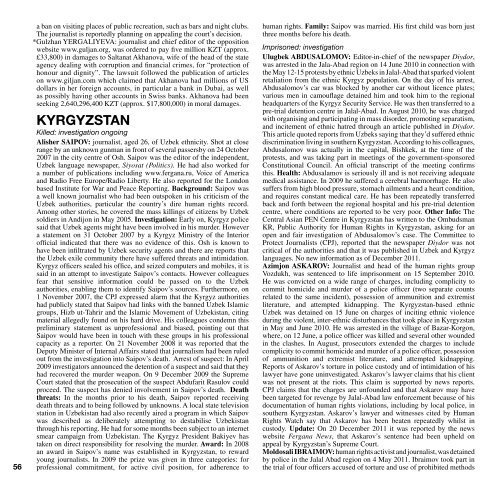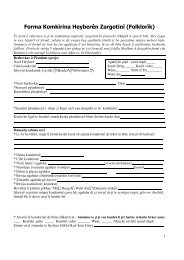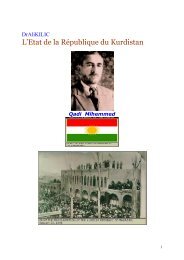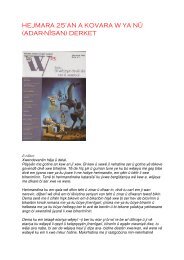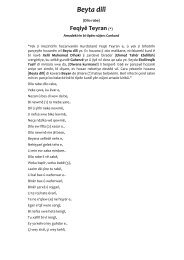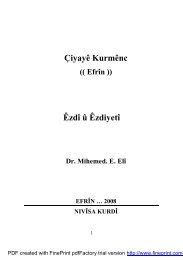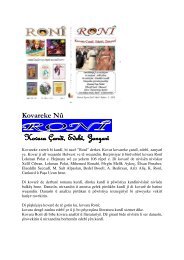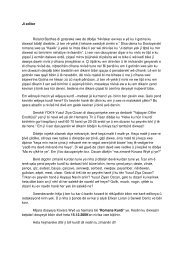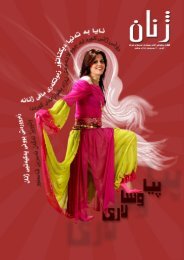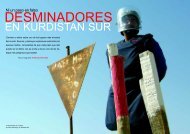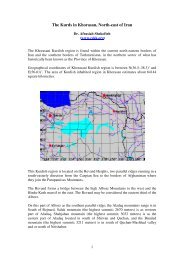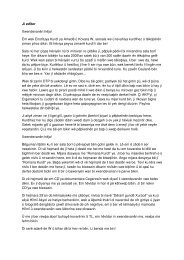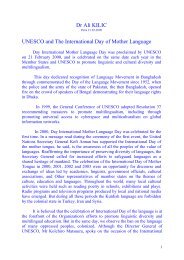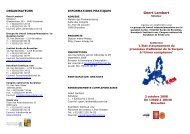Caselist - PEN International
Caselist - PEN International
Caselist - PEN International
You also want an ePaper? Increase the reach of your titles
YUMPU automatically turns print PDFs into web optimized ePapers that Google loves.
56a ban on visiting places of public recreation, such as bars and night clubs.The journalist is reportedly planning on appealing the court’s decision.*Gulzhan YERGALIYEVA: journalist and chief editor of the oppositionwebsite www.guljan.org, was ordered to pay five million KZT (approx.£33,800) in damages to Saltanat Akhanova, wife of the head of the stateagency dealing with corruption and financial crimes, for “protection ofhonour and dignity”. The lawsuit followed the publication of articleson www.giljan.com which claimed that Akhanova had millions of USdollars in her foreign accounts, in particular a bank in Dubai, as wellas possibly having other accounts in Swiss banks. Akhanova had beenseeking 2,640,296,400 KZT (approx. $17,800,000) in moral damages.KYRGYZSTANKilled: investigation ongoingAlisher SAIPOV: journalist, aged 26, of Uzbek ethnicity. Shot at closerange by an unknown gunman in front of several passersby on 24 October2007 in the city centre of Osh. Saipov was the editor of the independent,Uzbek language newspaper, Siyosat (Politics). He had also worked fora number of publications including www.fergana.ru, Voice of Americaand Radio Free Europe/Radio Liberty. He also reported for the Londonbased Institute for War and Peace Reporting. Background: Saipov wasa well known journalist who had been outspoken in his criticism of theUzbek authorities, particular the country’s dire human rights record.Among other stories, he covered the mass killings of citizens by Uzbeksoldiers in Andijon in May 2005. Investigation: Early on, Kyrgyz policesaid that Uzbek agents might have been involved in his murder. Howevera statement on 31 October 2007 by a Kyrgyz Ministry of the Interiorofficial indicated that there was no evidence of this. Osh is known tohave been infiltrated by Uzbek security agents and there are reports thatthe Uzbek exile community there have suffered threats and intimidation.Kyrgyz officers sealed his office, and seized computers and mobiles, it issaid in an attempt to investigate Saipov’s contacts. However colleaguesfear that sensitive information could be passed on to the Uzbekauthorities, enabling them to identify Saipov’s sources. Furthermore, on1 November 2007, the CPJ expressed alarm that the Kyrgyz authoritieshad publicly stated that Saipov had links with the banned Uzbek Islamicgroups, Hizb ut-Tahrir and the Islamic Movement of Uzbekistan, citingmaterial allegedly found on his hard drive. His colleagues condemn thispreliminary statement as unprofessional and biased, pointing out thatSaipov would have been in touch with these groups in his professionalcapacity as a reporter. On 21 November 2008 it was reported that theDeputy Minister of Internal Affairs stated that journalism had been ruledout from the investigation into Saipov’s death. Arrest of suspect: In April2009 investigators announced the detention of a suspect and said that theyhad recovered the murder weapon. On 9 December 2009 the SupremeCourt stated that the prosecution of the suspect Abdufarit Rasulov couldproceed. The suspect has denied involvement in Saipov’s death. Deaththreats: In the months prior to his death, Saipov reported receivingdeath threats and to being followed by unknowns. A local state televisionstation in Uzbekistan had also recently aired a program in which Saipovwas described as deliberately attempting to destabilise Uzbekistanthrough his reporting. He had for some months been subject to an internetsmear campaign from Uzbekistan. The Kyrgyz President Bakiyev hastaken on direct responsibility for resolving the murder. Award: In 2008an award in Saipov’s name was established in Kyrgyzstan, to rewardyoung journalists. In 2009 the prize was given in three categories: forprofessional commitment, for active civil position, for adherence tohuman rights. Family: Saipov was married. His first child was born justthree months before his death.Imprisoned: investigationUlugbek ABDUSALOMOV: Editor-in-chief of the newspaper Diydor,was arrested in the Jala-Abad region on 14 June 2010 in connection withthe May 12-15 protests by ethnic Uzbeks in Jalal-Abad that sparked violentretaliation from the ethnic Kyrgyz population. On the day of his arrest,Abdusalomov’s car was blocked by another car without licence plates;various men in camouflage detained him and took him to the regionalheadquarters of the Kyrgyz Security Service. He was then transferred to apre-trial detention centre in Jalal-Abad. In August 2010, he was chargedwith organising and participating in mass disorder, promoting separatism,and incitement of ethnic hatred through an article published in Diydor.This article quoted reports from Uzbeks saying that they’d suffered ethnicdiscrimination living in southern Kyrgyzstan. According to his colleagues,Abdusalomov was actually in the capital, Bishkek, at the time of theprotests, and was taking part in meetings of the government-sponsoredConstitutional Council. An official transcript of the meeting confirmsthis. Health: Abdusalamov is seriously ill and is not receiving adequatemedical assistance. In 2009 he suffered a cerebral haemorrhage. He alsosuffers from high blood pressure, stomach ailments and a heart condition,and requires constant medical care. He has been repeatedly transferredback and forth between the regional hospital and his pre-trial detentioncentre, where conditions are reported to be very poor. Other Info: TheCentral Asian <strong>PEN</strong> Centre in Kyrgyzstan has written to the OmbudsmanKR, Public Authority for Human Rights in Kyrgyzstan, asking for anopen and fair investigation of Abdusalomov’s case. The Committee toProtect Journalists (CPJ), reported that the newspaper Diydor was notcritical of the authorities and that it was published in Uzbek and Kyrgyzlanguages. No new information as of December 2011.Azimjon ASKAROV: Journalist and head of the human rights groupVozdukh, was sentenced to life imprisonment on 15 September 2010.He was convicted on a wide range of charges, including complicity tocommit homicide and murder of a police officer (two separate countsrelated to the same incident), possession of ammunition and extremistliterature, and attempted kidnapping. The Kyrgyzstan-based ethnicUzbek was detained on 15 June on charges of inciting ethnic violenceduring the violent, inter-ethnic disturbances that took place in Kyrgyzstanin May and June 2010. He was arrested in the village of Bazar-Korgon,where, on 12 June, a police officer was killed and several other woundedin the clashes. In August, prosecutors extended the charges to includecomplicity to commit homicide and murder of a police officer, possessionof ammunition and extremist literature, and attempted kidnapping.Reports of Askarov’s torture in police custody and of intimidation of hislawyer have gone uninvestigated. Askarov’s lawyer claims that his clientwas not present at the riots. This claim is supported by news reports.CPJ claims that the charges are unfounded and that Askarov may havebeen targeted for revenge by Jalal-Abad law enforcement because of hisdocumentation of human rights violations, including by local police, insouthern Kyrgyzstan. Askarov’s lawyer and witnesses cited by HumanRights Watch say that Askarov has been beaten repeatedly whilst incustody. Update: On 20 December 2011 it was reported by the newswebsite Fergana News, that Askarov’s sentence had been upheld onappeal by Kyrgyzstan’s Supreme Court.Moldosali IBRAIMOV: human rights activist and journalist, was detainedby police in the Jalal Abad region on 4 May 2011. Ibraimov took part inthe trial of four officers accused of torture and use of prohibited methodsin their work on 03 May 2011 in the Suzak district court. The suspectswere acquitted and demanded the immediate detention of Ibraimov. Hislawyer requested on 5 May 2011 that Ibraimov be taken out of detentionas he is undergoing chemotherapy for cancer and it would therefore notbe safe to keep him in prison. He has since been placed under housearrest. <strong>PEN</strong> is seeking an update.AttackedShokhrukh SAIPOV: Uzbek journalist and editor of the news websiteUzpress.kg, was brutally attacked on 10 August 2011 in the city of Osh,south Kyrgystan. Saipov was the brother of the murdered journalistAlisher Saipov (above). He was found unconscious in the Aravan districtof the town, having suffered concussion, loss of several teeth, a brokennose and severe damage to his face. Although the motive for the attackremains unknown, it is allegedly related to the ethnic divisions whichhave engulfed Kyrgystan since the killings in Osh and Jalalabad in June2010.LATVIAImprisoned - Investigation*Leonīdis JAKOBSONS: owner and editor of the news websiteKompromat and winner of the 2009 National Journalism Prize for‘Defence of Media Freedom’, was arrested on 11 December 2011 afterpolice had raided his apartment, seizing two computers and several datastorage devices. It was reported that the police also seized the serverswhich hosted the Kompromat website from the Internet Service provider.It is believed that Jakobsons was arrested on suspicion of “illegallyacquiring electronic communications data”. The allegations are reportedto stem from Jakobsons’ posting of a series of emails on his websitethat had been sent or received by Nils Ušakovs, mayor of Riga and aformer member of the Latvian parliament. The emails, which Jakobsonsbegan posting on 17 November 2011, indicated that the mayor had beeninvolved in suspicious correspondence with a member of the Russianembassy.MOLDOVAOn trial – investigation*Eduard BAGIROV: Russian blogger and writer, detained on 16 June2011 and questioned over his role in street violence which broke out inApril 2009 following a contested election won by the Communist Party.The authorities’ only confirmed that Bagirov had been arrested on 27June 2011 when they denied his request to be released while an investigationis being carried out. There have been unconfirmed reports thatBagirov is being held in poor conditions and denied the right to receivevisits, talk to his lawyer, or to see a doctor. On 13 September 2011 aMoldovan court extended his arrest for 30 days. On 7 October 2011 theRussian embassy expressed concerns about the arrest of Bagirov and hisprison conditions, stating that the Moldovan investigative bodies had notprovided any evidence of his guilt. Bagirov was reportedly released on11 October 2011 and placed under house arrest.RUSSIAKilled*Ruslan AKHTAKHANOV: Chechen businessman, public figure andpoet, was shot dead in the street in Moscow on 15 November 2011.Akhtakhanov (58) was shot several times by an unidentified gunmanoutside his home at around midnight on 15 November 2011. The gunmanfled in a car which was later found abandoned several miles away. A pistoland silencer were discovered in the vehicle. The poet was professor atthe Modern Humanitarian Academy in Moscow and member of Russia’sWriters Union. He was reported to have outraged Muslim seperatists inthe Noth Caucaus on several occasions due to his staunch attacks on theChechen independence movement.Khadzhimurad KAMALOV: influential journalist and founder of theindependent Dagestan-based weekly newspaper Chernovik, was shot deadby a masked assailant on 15 December 2011. Kamalov was reportedlyshot up to 14 times by the unidentified assailant as he was leaving theoffices of Chernovik in the capital of the southern republic of Dagestan,Makhachkala, shortly before midnight. The gunman reportedly fled thescene by car. There has been a long history of harassment towards thestaff of Chernovik, with five of its journalists being arrested on trumpedupcharges of “extremism” between 2008 and 2011. The newspaper hasfrequently addressed highly sensitive topics in the southern republicof Dagestan, in particular reports of police abuses in neighbouringChechnya. The Centre to Protect Journalists (CPJ) also stated that, in arecent television interview, Kamalov had made critical comments aboutalleged regional government corruption.Killed – investigation/trial under wayNatalia ESTEMIROVA (f): Journalist and human rights defender, wasabducted as she left her home for her office in Grozny, and was murderedon 15 July 2009. Her body was in woodland in neighbouring Ingushetia.She had been shot in the head and chest. Estemirova, of Russian-Chechendescent, worked at the Grozny office of Memorial, Russia’s best knownnon-governmental organisation. She investigated torture, killings andother abuses in Chechnya, and was the first recipient of the annual AnnaPolitkovskaya Award given by the Reach All Women in War campaigninggroup. Estemirova was also awarded for her courage by the Swedish andEuropean parliaments. She worked with Politkovskaya from 2001 until2006, exposing abuses carried out by Russian armed forces in Chechnyaand by Moscow-backed Chechen officials. Russian President DmitryMedvedev condemned the murder and ordered an inquiry. The ChechenPresident Ramzan Kadyrov also called for those responsible to be broughtto justice. The organisation Memorial, has since closed its Grozny office,fearing for the safety of its staff. Update on the investigation: In lateFebruary 2010, the agency investigating Estemirova’s death confirmedthat it had identified the murder suspect, who was said to be in hiding.Estemirova’s supervisor at Memorial told new agency Interfax that,after gaining access to some of the case’s investigative materials, it wasdiscovered that the suspected murderer had already been killed. Russianinvestigators deny this. On 12 July, the Moscow newspaper, NovayaGazeta, published an article criticising the investigation for a series offlaws. These included a failure to interview key witnesses, a failure tothoroughly analyse DNA material collected from Estemirova’s body,and a failure to place at-risk witnesses under protection. The article alsocriticised the investigation for allegedly focusing on a single, suspectwho was already dead. Other information: The Chairman of the 57


